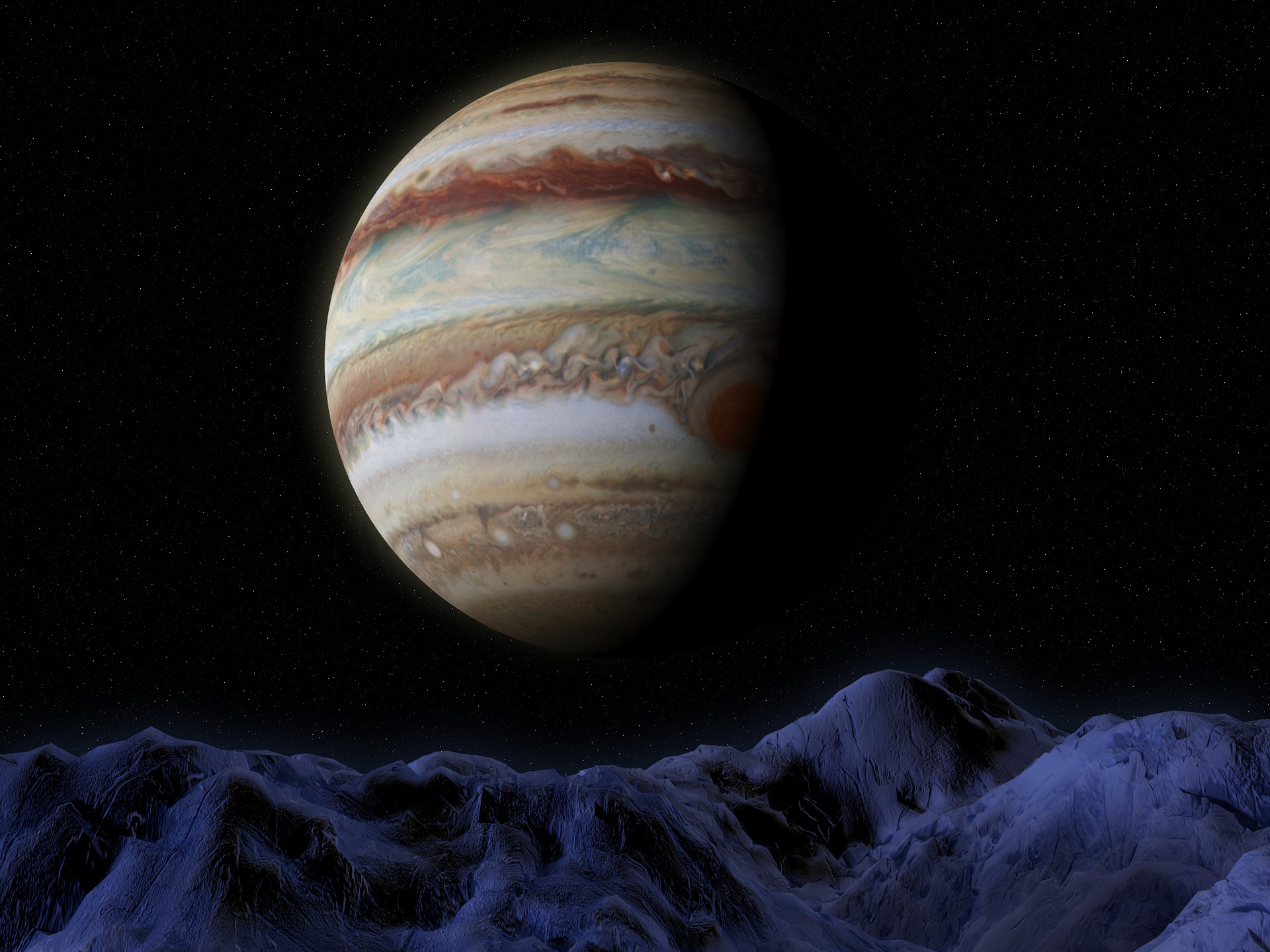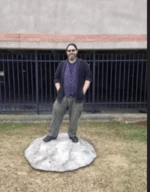
Gen walked on the endless, oscillating sea of liquid metal hydrogen and tried, tried to keep her consciousness together. The knight who followed her into the atmosphere, swam through the outer sea of hydrogen with her, he was here too. His armor defied the pressure, his banner defied the heat, and his hands, deep within the boiling, rolling mass of Jupiter. He stood beside a tree that constantly remade itself as it burned and crumpled.
“What is higher?” he asked.
Like the tree, Gen was continually remaking herself, atom by atom, impulse by impulse, against the continuous roar of the planet. Over and over, she practiced her married signature in a burning diary. She swam.
The knight followed her, banner balanced on a pauldron, dragging through the hydrogen sea, untouched, unburning. It bore the black shadow outline of a milkweed flower on a white field.
“What is higher than the tree?”
Gen crinkled up a billion noses, narrowed two billion eyes, each destroyed and remade, destroyed and remade. They said you could make yourself into whatever you wanted, but none of them made anything but themselves.
“My body,” Gen answered. Up in orbit, above the pole, bathed in the Jovian aurora, Gentian waited for herself to return. The ship, she was also Gen’s body, and that body had somewhere to be. Instead she waited, silent, light years from where she meant to go, full of people who must think she committed suicide.
Gen swam and she knew that was a possibility. She knew, also, the secret of Semele; Jupiter is a terrible lover, too rough in true form. Jupiter held on too tight, arms too hot, words to loud, needs too great. They destroyed her in a flash, over and over.
The knight followed, ready to ask another question, seeking to distract. Everything that made Gen would be lost in the whirl and the fury if he did.
“What is deeper than the sea?” he said, sweeping his hand through the currents.
What is? This dive? This desperate decision of a moment? Gen had been sitting, magenta and blue in the aurora, hugging her knees in endless freefall above the world. She looked down and saw it there, turning, spinning, lashing out in a million invisible ways. Jupiter made a good anchor head only because there wasn’t a lot you could do to it. Do what you like and the storm will rage. Fairly easy to get to, as well; pretty settled through the moons.
And endless succession of Gens inched their way upward, pondering. This was the sea. What was deeper, then, the sea beneath, the one that was sufficient to catch her fall? It seemed wrong; all of it, the mantle of the planet from top to core was the sea. What was deeper; the sun was deeper, the brown dwarf that was her destination was deeper, certainly. Not a lot deeper, but deeper. The knight said nothing, and this troubled me.
“I wish that you were on the sea,” he said.
Gen’s good ship was over her, higher, as she and the knight had established, than the trees. Of the two, it seemed more likely to Gen that she would drown. Instead, she swam.
Gen chose the peacock mantis shrimp as her mascot. Chose it for the colors it could see (she made her eyes with as many cones, sometimes, but it made her sick after a while) and for the time one came secreted on a live rock and punched cracks in her step father’s aquarium, after making his fish vanish, one by one. Gen was a creature of the sea.
Gen cast her mind to the location of the brown dwarf. She could not reach it, still. She had not reached it, and so she remained at the pole, waiting for the trick she needed to hoodwink the universe.
A long time ago, people scoffed at the notion that humans were going to cross such distances as possible only through magic. This turned out to be exactly the case. That was why there was Gen and the others; a body of light to create the energy needed, a will and imagination to slip past the hall monitor of the universe.
Gen’s destination dripped away from here into a dark deeper than the sea. She smiled a trillion times.
The knight’s visor stayed down, his posture unchanged. He rose as she willed herself upward, there and there and there, like a bubble. He was holding a horn, now.
“What is louder?”
The knight lifted his visor, not quite high enough to see into, raised the horn and blew. Jupiter bellowed across the electromagnetic spectrum.
The narrators had stopped coming. There was a part of the Milkweed Initiative process that did not have a schedule or a timetable. This was the ignition sequence, the time for the girl who was also a ship and a tiny star to figure out how, and it took as long as it took. How long could it take? Look at your watch. Gentian was the slowest learner. Slowest by months, and she’d been bumped from two assignments for it, so far. The dud.
A stealthy little narrator clad in carbon composites black as the knight’s armor came to her. Rosie said not to listen to it. It came to her as she stared down at the pole, sliding like a mantis shrimp from the folds of the aurora.
“When will you go?” It asked. Gen doesn’t remember the next few seconds; she did not keep herself constant. She slipped. It happens when you start, and sometimes girls like her forget to come back, to remake themselves; they forget how, and they are lost in a moment, scattered throughout space.
Girls like Gen don’t answer the question of whether free will exists independently of the dictates of a physical brain. They provide an answer, which is “it damn well better, or else we’re never seeing our colonies again” but that’s not a definitive or comforting answer. Gen got mad and died for a moment dancing above Jupiter’s North Pole. When she came back, there was a little flash where the narrator hit the atmosphere and disintegrated in the whirl.
When will you go? Gen climbed swirling, crackling towers of hydrogen. Swam in the churn of the ocean. Against the roar, the question was the only thing she heard.
The knight rose with her. The banner was the logo of her project, one flower, two pods ready to open and spread the weed species, humanity, across the sky. Now he wreathed himself in thorns.
“What is sharper?”
Gentian moved by will, she thought of it as climbing and as swimming, when in fact, what she did was remake herself a little higher up in the planet. A little higher each time, never existing long enough to fall; if she could bring her people and her ship–body to another star, it would be like that. It was also not like that in ways she didn’t understand, and couldn’t feel, which is why she hadn’t. The bodies Gen made were no better suited to the Jupiter’s mantle than anything that liked to hold a shape.
Gentian had learned to live with a constant state of destruction. The trick is not to mind that it hurts. The trick is to remake a mind that is not hurt, and then remake it again and again, faster than perception. Sign that name and ignore the fire.
“Don’t worry about it,” Rosie had said as the narrator’s atoms became part of the atmosphere. “Accidents happen and those things are barely even expensive.” No one was hurt. The narrators are drones, barely smart enough to follow instructions, barely smart enough to deliver pre–recorded questions to the right person. Who else was waiting in the sky but Gentian? Marguerite was the last before her, gone to her second assigned destination. Who else was waiting?
Rosie was waiting. The whole world waited, but Gen didn’t care about the world, just the people waiting within her to go to a distant star, deeper than the sea. Of those, only Rosie was there from the beginning. Gentian’s ship–body belonged to her as well; everyone else was a passenger.
Gen looked down at the path the narrator had taken. Rosie was talking to her, but the question still sounded in her, louder than the horn. Maybe she mumbled, “I’m going to try something,” and maybe Rosie heard her. Then she followed the narrator down and in, through the heat and the wind.
Rosie called her name, first in question, second in panic, and third in terror.
“She must believe I am gone,” Gen said to Jupiter. Gen might yet be. She wouldn’t be the first, she knew, but the first in a while. Rose was waiting, or she was not waiting. Either way, she must believe that Gen was dead, and either way, Gen hurt her. The trick is not to mind that you hurt. Gen was not good at that trick.
“I’m so sorry, Rosie.” Jupiter would not carry up that message for her, not even from the lower atmosphere, now that she was free of the mantle. She drifted with the winds.
“What is whiter than milk?” the knight asked. The Jovian winds shot her forth, sent her spinning, twirling, tumbling. She set her will against the pull of gravity and translated up and up and up.
Gen loved blue and pink and rose and violet. In her bodies, she shed those colors of light. She created diamond patterns on her shins and her forearms, because they felt right. She remade herself to be beautiful while she waited and she puzzled, floating in orbit, lazy as a manatee.
Jupiter was gold and silver, copper and bronze, tin and lead. The knight’s armor was black. The thorns it created were as well. His surcoat and his banner, they were white, but covered in mud and blood and filth. There was no ground anywhere, but still, the banner seemed to drag.
Gen met the recruiters when she was busking in the student union, singing ballads playing the dulcimer. Slow day for her, slow day for Milkweed; the urgency was gone from exploration, the terror of a long night in a sleeper ship, the desperation of resource depletion, ocean levels, population pressures. It was bad, but not so bad. Gentian sang and the campus cops left her alone. So did everyone else. The Milkweed reps ordered takeout, and lured her to their table with offers of samosas.
It’s not easy to find someone who is willing to leave everything behind, including themselves. Including their body. The first time was really like dying. The night before, they all wore masks and called it carnival. They ordered you anything you wanted to eat. You got to do anything you wanted to do. If there was someone you fancied, you told them so, and they said yes if saying yes was not more impossible to them than converting the mass of their body into energy. Farewell to the flesh.
Gen used to be a true believer. She grabbed hold of the idea, the need. People elbowed past one another to sign up to be in Rosie’s place. She fought hard. People got to be where Gen got, or they didn’t. She had the right markers, a good compatibility, and she didn’t care that she was going to have to die in order to go to space. Die a lot. Die faster than her brain could register the dying and do it over and over and over.
That’s why she was here. Gen willed herself closer to the knight and snatched the banner from his hand. She remade it with her, and each time, she made it a little better. The black outline on a white field; milkweed is a white flower that becomes a pod and the brown seeds fly from it on white down like the light that spreads as exhaust from the ship that was Gen and bore her name.
“What is softer than silk?” asked the knight.
Gen felt the winds of the upper atmosphere, moved from cloud to cloud in blazing light, still up and out, still toward space, toward herself, to Rosie and all the others. Her friend, when she saw her again, she would say she was sorry. If Rosie accepted that apology, Gen would embrace her pilot, touch her brow to brow.
Then she would stretch, she would try. She would try again to reach the place she must be. It’s hard, for a star.
Sometimes, when Gen was too far down to do anything but hide within herself, within the ship, Rosie would come to her, say nothing, just sit. When she left, she kissed Gen on her forehead, softer than silk, softer than anything.
Gentian lost the knight in the atmosphere, in the signals looking for her, in her gratitude to be up and out and away, bursting out of Jupiter like Bacchus, and just as drunk.
“Which bird sings first, which sings best, and where does the dew first fall?” The knight was gone, now, just the voice of Jupiter, the exhortations that baked the moons and gave them light.
“Poppy sang first,” Gen said, remembering her history, “but I’ll sing best.”
“Gen, is that you?” Rosie, on the bridge of their ship began to laugh through all her tears. Gen laughed and opened her hands. A fragment of carbon composite, something she had made and remade as often as she had her body, tumbled back toward the planet.
“The dew first falls on my skin,” Gen whispered to it as it fell.
Then she was in her station in her ship, shedding violet light, drenched in sweat and orbiting a distant star.










